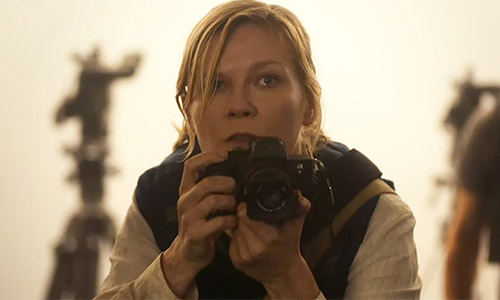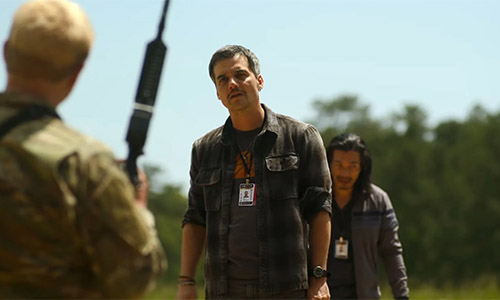 Tell me you’re making a political movie without telling me you’re making a political war movie without telling me you’re making a political war movie. Civil War, Alex Garland’s (Annihilation, Ex Machina) newest film in which The United States has become even more divided and intense than at the time of its 2024 release, serves as an ominous narrative about the potential future of our country. While it’s sure to be divisive, Garland is purposeful in not picking a side while being vague about the two sides. Outside of Dune 2, Civil War is the film that received the most buzz after the first four months of the year. Rightfully so.
Tell me you’re making a political movie without telling me you’re making a political war movie without telling me you’re making a political war movie. Civil War, Alex Garland’s (Annihilation, Ex Machina) newest film in which The United States has become even more divided and intense than at the time of its 2024 release, serves as an ominous narrative about the potential future of our country. While it’s sure to be divisive, Garland is purposeful in not picking a side while being vague about the two sides. Outside of Dune 2, Civil War is the film that received the most buzz after the first four months of the year. Rightfully so.
Garland (who both directed and wrote the film) has much to say. Yet, he doesn’t leave us with cut-and-dry answers, which will annoy some, maybe even many. Even more frustrating might be that he drops us into what feels like the middle of a story without learning much about what got us there. I can understand and even appreciate that. Going into my viewing, I knew this would not be the most linear movie and would leave much for interpretation. Had I not known that, I may have been disappointed. However, knowing that other filmgoers wouldn’t know more or less than me felt reassuring.
The two trailers I saw of the film gave the impression that the film would be nonstop action from the opening to the ending frame. Initially, I feared Civil War might be a chaotic mess. However, while muddled movies often resonate with audiences, more infrequently, they struggle to earn positive critical acclaim. Ironically, the film was slightly better received by critics than by audiences. While it is certainly a wild ride, this film had many moments of quiet introspectiveness. This softness allowed us to get to know our lead characters while, at the same time, preparing us for each subsequent encounter.
Before the review, I would suggest going in as blind as possible. It won’t likely be the movie you think it will be. Hopefully, you’ll be as pleasantly surprised as I am in this war film that looks at a divided country’s political landscape and civilian unrest yet refuses to take sides, which side is which, and what initiated this unrest. Instead, it looks at four journalists covering the war. Three journalists are veterans, seasoned enough to know their job is to attain and present unbiased stories, photos, and interviews, which others can read, hear, and view, using their presented information to make their own opinions.

The film opens with the country’s corrupt three-term president (Nick Offerman – The Founder, Dumb Money) practicing a speech in front of a mirror. Garland spends what feels like an extraordinary amount of time with the president as he prepares to deliver news in which he touts the victories of the loyalist states over the Western Forces (an alliance formed by Texas and California), who succeeded from the Union for reasons unknown. Some criticism for those who haven’t liked the movie has been the unknown of what got the country to its current state. I liked that the film spent no time explaining how the conflict began, the motivations of each side, or what they hoped the end result would be. We never learn which characters are on which side or what those sides even are.
Instead, We are dropped right in the middle of the action, with almost no backstory. In the wrong film, this wouldn’t have worked. In a Garland film, the director can be trusted. Garland purposely blurs the lines. He also blurs his characters. While we certainly have the protagonists we root for, we don’t know them well enough to see if they are good people or journalists that we objectively witness. Regardless, we need an investment in at least one character for a successful story. We do have that in Civil War.
Our lead protagonists are a foursome led by renowned war zone photojournalist Lee (Kirsten Dunst – Melancholia, Spider-Man 2) and writer Joel (Wagner Moura – The Gray Man, Elysium). We first meet Lee and Joel when they are in New York City, watching the President deliver a speech on their hotel room television while explosions blast in the distance outside their high-rise window. Lee and Joel plan to drive to war-torn Washington, DC, the next day (though they will have to go an indirect route that involves going through Pittsburgh, PA, and Charlottesville, VA) with the hope of interviewing the president. Joining them on the trip is a senior retired journalist, Sammy (Stephen Henderson – Fences, Causeway), and Jessie (Cailee Spaeny – Priscilla, On the Basis of Sex), an aspiring photojournalist who reveres Lee.

More than a modern-day war film, Civil War reminded me of the AMC television show The Walking Dead. While there certainly weren’t any zombies, there was a comparable amount of dread. The group encountered situation after situation with great trepidation, never knowing what awaited them at each turn or who might be an ally and who might be an adversary. We get plenty of both.
The film clocks in at just under two hours. So much happens that it feels like it’s 30 minutes. I would have liked to have seen the lead characters fleshed out more, but I appreciate that this intent was purposeful. I would have liked to have seen more with Jessie. This was our impressionable character. I would have enjoyed seeing more of the inner turmoil she may have been battling in terms of remaining objective and neutral like her three counterparts versus allowing her humanness to, if nothing else, question her purpose and direction. We got glimpses. A criticism of the film would be that Garland didn’t allow us to connect with the characters. While we cheered for them, I didn’t quite care enough about what happened to them. An opportunity existed for us to learn about how each situation affected Jessie.
Civil War was an immersive experience. The cinematography, set designs, and sound made us feel like we were press team members on the battleground frontlines. Dunst brought a ferocity to Lee that I hadn’t seen with any of her previous roles. She carried the movie, primarily through the quieter scenes. She provided just enough mentorship to Jessie by answering her questions and prepping her for what was to come while not being preachy. Spaeny has had back-to-back stellar performances (her performance as the title character in Priscilla was worthy of an Oscar nomination). Not to be forgotten is the performance of Jesse Plemons (Antlers, The Power of the Dog). Plemons is a rogue mercenary who is onscreen for just a single scene. It’s the most impactful scene of the film, showing the depravity of where this civil war has taken the country.
While you may not remember all of the details about Civil War, they’re unlikely to leave your mind after viewing it. The film’s details aren’t as important as the lingering questions that Garland leaves us, with the most important being, “Could this really happen?” and “How do we go about stopping this from ever happening?”
Plot 9/10
Character Development 7/10
Character Chemistry 7/10
Acting 8.25/10
Screenplay 8.5/10
Directing 9.5/10
Cinematography 9.25/10
Sound 10/10
Hook and Reel 9.5/10
Universal Relevance 9.5/10
87.5%
A-
Movies You Might Like If You Liked This Movie
-
- Annihilation
- Elysium
- We Were Soldiers
- Children of Men
- Sicario